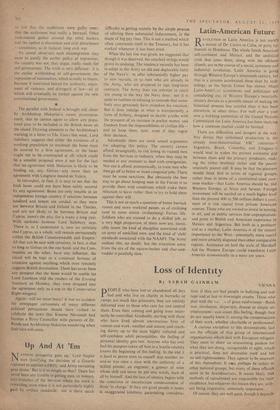Up And At 'Em
r AT1ON A L prosperity goes up,' Lord Napier
N says (justifying the decision of a Guards regiment to appoint a PRO), 'and Army recruiting goes down.' But is it as simple as that? There has never been any trouble in getting men, or women, into branches of the Services where the work is rewarding, even \‘ hen it is not particularly highly paid by civilian standards: nor is there much difficulty in getting recruits by the simple process of offering them substantial inducements, in the shape of big pay rises. This is not a method which often commends itself to the Treasury, but it has worked whenever it has been tried.
When the last rise was given, we suggested that though it was deserved. the attached strings would prove its undoing. The tendency recently has been to adopt in the Army an old and deplorable habit of the Navy's : to offer substantially higher pay to new recruits, or to men who are already in , the Army, who are prepared to sign long-term contracts. The Army does not attempt to catch 'em young in the way the Navy does: nor it is quite so ruthless in refusing to concede that some- body may genuinely have mistaken his vocation. But it does indulge in what is transparently a form of bribery, designed to dazzle youths with the prospect of an increase in pocket money and freedom from the responsibilities of civilian life— and to keep them, later, even if they regret their decision.
Admittedly there are some sound arguments for adopting this policy. The country cannot afford, strategically, to risk losing its trained men from the Services to industry, when they may be needed at any moment to deal with emergencies. Nor can it afford, economically, to train men who then go off to better or more congenial jobs. There must be some sanctions. But obviously the best way to go about keeping men in the Forces is to provide them with conditions which make them reluctant to leave rather than to try to hold them against their will.
This is not so much a question of better barrack rooms and more weekend passes, as of civilising (and to some extent civilianising) Forces life. Soldiers who are trained to do a skilled job, as a very high proportion of them now are, inevit- ably resent the kind of discipline associated with an army of unskilled men, and the kind of 'club' standards associated with the NAAFI. The Army realises this, no doubt, but the transition away from the era of the square-basher and char-and- wadder is painfully slow.


































 Previous page
Previous page